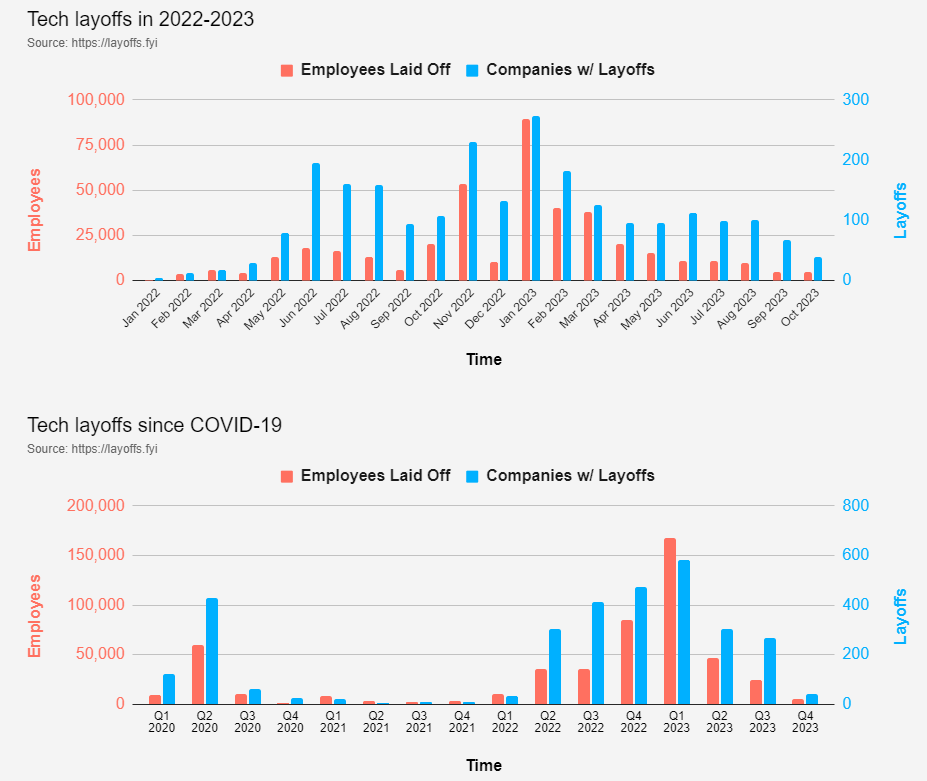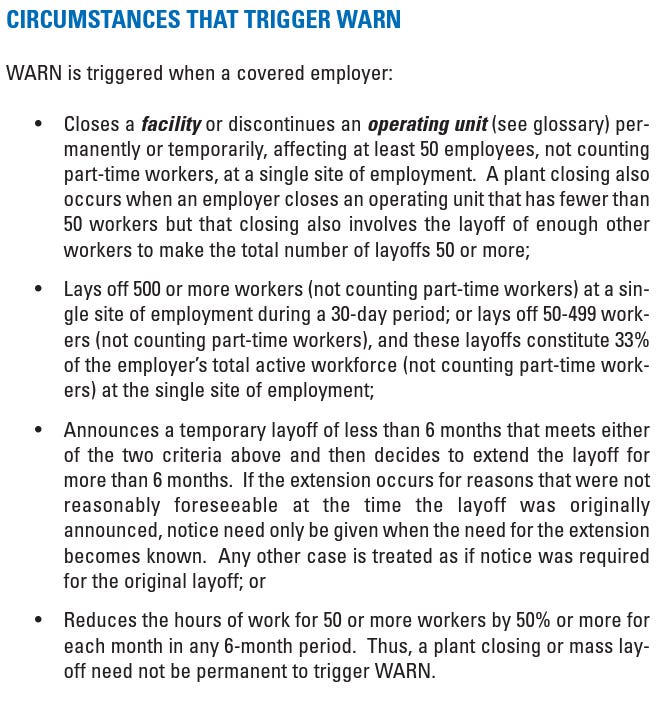Archive: Professional Mortality
Layoffs and how to prepare for the often inevitable
This is an archive copy of a post that originally ran on Substack in October of 2023.
With spooky season in full swing, it seemed timely to talk about the phobia that nearly all workers have in common: getting laid off. If a twinge just went down your spine from even the thought of losing your job, it’s understandable. Not knowing where your next paycheck will come from is extremely stressful. After all, there are few things that will damage an otherwise stable life faster than an unexpected job loss. For the last 18 months in particular, scrolling LinkedIn has tended to include seeing updates from people caught up in layoffs. At the time of this writing, layoffs.fyi reports that tech companies have laid off more than 244,000 employees thus far in 2023 vs~165K in all of 2022.

It’s true that tech is just a subset of the economy, but given that it’s the sector where many investors expect growth to come from it serves as a useful barometer for the broader economy. That said, this will not be a piece focusing exclusively on doom and gloom. After a little table setting, we’ll get into what you can do right now to steel yourself against the Layoff Grim Reaper and set yourself up for future success.
Why Layoffs Happen?
If you’ve been working in Corporate America™ for any amount of time you’ll have seen layoffs get announced in many different ways. While it is almost always described as a difficult decision, what often doesn’t get mentioned explicitly is the exact reason why. Broadly speaking, there are three main causes of layoffs:
- Cause 1: Something has changed in the operations of the company and it is now losing money at current payroll levels.
- Example: ABZ Industries loses several of their biggest clients to competitors with no immediate alternatives to replace those lost sales. Current staffing assumed a certain level of sales/production and layoffs must be done in order for the company to continue to operate at all.
- Actual operating models and cash reserves would make a lot of difference for how this hypothetical would play out in the real world, but this is basically the worst case scenario outside of fully shutting down operations.
- Cause 2: Company is still profitable before layoffs, but revenue growth might be slowing or even declining, thereby increasing payroll as a % of sales compared to historical levels (that’s bad) and reducing bottom line profit.
- This is scenario is extremely common at publicly traded companies so no need to make up a hypothetical. The layoffs.fyi page referenced previously has direct links to news articles for the individual company announcements they’ve documented.
- Layoffs could be made across the entire enterprise to reduce total headcount, within specific business units that are underperforming relative to others, or in areas that are no longer strategic priorities.
- Publicly traded companies in particular are always trying to deliver increased returns for shareholder, and doing “more with less” is one way to improve the bottom line in the immediate near term.
- Cutting too deep for short term benefit can often lead to longer term issues as remaining staff get spread too thin and are unable to continue to perform at a high level.
- Cause 3: Your company gets acquired resulting in substantial redundancy, most frequently in back-office functions like accounting, HR, and others.
- The size difference between acquirer and acquiree will be the biggest factor in determining how many layoffs are needed.
- Secret Fourth Cause: A company in your same industry decides to conduct layoffs for similar reasons as Cause 2 so leadership at your company decides they need to as well in order to remain serious/credible to shareholders.
- If there is a wave of layoffs across a specific industry, the urge to join in will be substantial. A phrase you will often hear used is rightsizing, but I think Logan Roy might have actually said it most succinctly.

Warning Signs
Can you actually see layoffs coming? Official announcements in advance from management are not common. Often when the headline breaks that “X company is laying off Y% of their workforce” the impacted employees are finding out that same day. The main exception would be situations where the WARN Act would be triggered and require a 60-day notice period. As you can see below, the WARN Act is meant to handle substantial layoffs or cases where an entire worksite is going to be closed. If you work in marketing at Google, the best you can hope for is your boss telling you to polish up your resume based on what they’ve been hearing in the rumor mill.

Hiring freezes would be the other red flag to consider. With freezes, the company is likely experiencing some form of market headwinds or other uncertainty. The hope is that by not hiring for a period of time they can get through whatever dip they might be experiencing and resume hiring once there is more certainty around other aspects of the business.
Preparing For Future Pain
There are no shortage of quotes from historical figures about the value of preparation, but this one from Lao Tzu felt the most applicable: “Deal with difficulties while they are still easy.” Having any sort of plan for dealing with future adversity can keep you from being overwhelmed when it comes.
As a quick aside, there are countless misattributed quotes from historical figures out there and years of people gaming Google search results have only mucked things up further. If you are going to reach for quotes in your writing, you will need to do more work than you might think if you actually care about the quotes being real/correctly attributed.
While there are always exceptions, the best thing you can do for your professional sanity is to assume you are going to be laid off at least once in your career and to acknowledge this fact:
No matter how good of a performer you are, or how critical you think your role might be, unless you own the company you can be deemed expendable in the end.
This does not mean that you should go about every day like a dead man walking. With the right preparation, this truth can be liberating. With that in mind, what should you be doing right now?
- Understand your household’s financial situation and build an emergency fund that suits your risk tolerance.
- If you lost your job tomorrow, do you know how long you could go without piling on debt?
- There is no right answer here, but even a couple months of cushion can make a big difference.
- Whether it is losing your job or some other large unplanned expense (new roof, new appliances, flooded basement, etc..,) a stockpile of surplus cash gives you options on how you choose to deal with that situation.
- If you have six months of financial runway for example, you can be more picky on what job you take next versus needing to take ANY job.
- More runway can also give you the confidence to leave a bad work environment even if you don’t have an immediate replacement.
- Always be networking.
- It’s true, networking can feel exhausting and superficial at times, but staying in touch with your former colleagues and meeting new people in your industry/job function will pay dividends in the long run.
- Having a referral can put your resume at the top of the pile and increase your chances of getting an interview.
- Take job interviews even if you think you’re content in your current role and keep your resume updated.
- Interviews are networking opportunities in and of themselves.
- If you are transparent, even a situation where you turn down an offer can still leave a positive impression with your counterparty.
- You also might find out your current compensation is well below current market rates. Studies are pretty clear that staying at one company for too long will leave you underpaid.
- Approach your career like a mercenary.
- Despite claims to the contrary, loyalty does not go both ways at the vast majority of companies. As we’ve established, they will cut you loose if they must.
- You can work hard and be a top performer but if you think you aren’t being treated fairly you need to be willing to leave.
- If the layoff writing is on the wall, the best outcome is for you to find yourself a new job before the talent pool you are competing against gets much larger.
- You might recognize the original image below. If you find yourself on the wrong side of the box, start looking for another job.

Closing Thoughts
If you get laid off, the hardest thing will to not take it personally and tumble into a spiral of self doubt about your skills. Do not let yourself fall into this trap. If you follow even some of the recommendations that have been made here you will be ahead of the game compared to everyone else thrown into the job seeking pool with you. Take every advantage you can get and have confidence in yourself, it can make all the difference.




